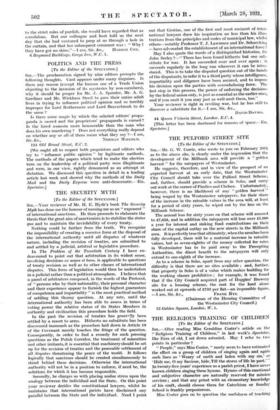THE SECURITY MYTH
[To the Editor of the SPECTATOR.] SIR,—Your reviewer of Mr. H. E. Hyde's book The Security Myth has done me the honour of naming me as an " exponent " of international sanctions. He then proceeds to elaborate the thesis that the great aim of sanctionists is to stabilize the status quo and to maintain the inviolability of every treaty.
Nothing could be further from the truth. We recognize the impossibility of creating a coercive force at the disposal of the international authority until all disputes of whatever nature, including the revision of treaties, are submitted to and settled by a judicial, arbitral or legislative procedure.
In The Problem of the Twentieth Century I have en- deavoured to point out that arbitration in its widest sense, involving decisions ex aequo et bono, is applicable to questions of treaty revision as well as to other classes of international disputes. This form of legislation would then be undertaken in a judicial rather than a political atmosphere. I believe that a panel of arbitrators composed, in the words of the Protocol, of "persons who by their nationality, their personal character and their experience appear to furnish the highest guarantees of competence and impartiality" is the most practical method of settling this thorny question. At any rate, until the international authority has been able to assess in terms of voting power the relative status of its States Members in authority and civilization this procedure holds the field.
In the past the revision of treaties has generilly been settled by a resort to arms. Hitherto no substitute has been discovered inasmuch as the procedure laid down in Article 19 of the Covenant merely touches the fringe of the question. Consequently, in order to find a remedy for such pressing questions as the Polish Corridor, the treatment of minorities and other irritants, it is essential that machinery should be set up for the revision of treaties and the peaceable settlement of all disputes threatening the peace of the world. It follows logically that sanctions should be created simultaneously to stand behind these decisions. Otherwise the international authority will not be in a position to enforce, if need be, the solutions for which it has become responsible.
Secondly, he charges us with placing undue stress upon the analogy between the individual and the State. On this point your reviewer derides the constitutional lawyers, whilst he maintains that international jurists have disclaimed any parallel between the State and the individual. Need I point out that Grotius, one of the first and most eminent of inter- national lawyers drew his inspiration no less than his illus- trations from the principles and codes of municipal law, whilst others—notably Professor T. J. Lawrence and Dr. Sehneeking —have advocated the establishment of an international force ?
May I also quote the words of a distinguished historian, Sir John Seeley ?—" There has been found hitherto but one sub- stitute for war. It has succeeded over and over again ; it succeeds regularly in the long run wherever it can be intro- duced. This is to take the disputed question out of the hands of the disputants, to refer it to a third party whose intelligence, impartiality and diligence have been secured, and to impose his decision upon the parties with overwhelming force. The last step in this process, the power of enforcing the decisions by the federal union only, is just as essential as the earlier ones, and if you omit it you may just as well omit them, too."
Your reviewer is right in reviling war, but he has still to discover a substitute for it.—! am, Sir, &c.,
DAVM DAVIES.
44 Queen Victoria Street, London, B.C. 4.
[This letter has been shortened for reasons of space.—En. Spectator.]














































 Previous page
Previous page